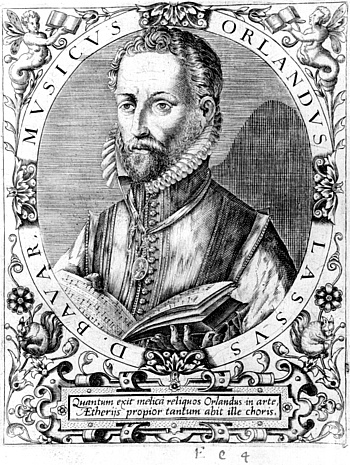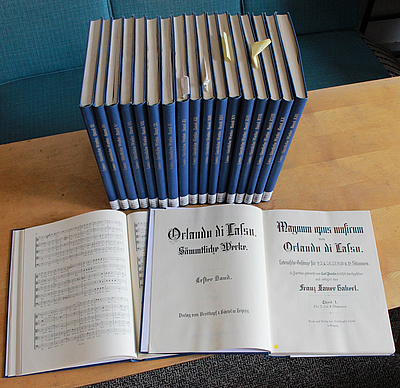Composer known throughout Europe and Bavarian court music director

Living and composing in Munich, Bavaria, Orlande de Lassus (1530/32–1594) was the probably most significant, in any case the most successful and most famous composer of the second half of the 16th century. His œuvre, encompassing about 1360 compositions in prints and manuscripts, was widespread during his lifetime and long after. To this day, it is part of the repertory of numerous vocal ensembles exploring the music of the Renaissance while also being performed by amateur choirs. Lassus ranks among the most recorded composers in the history of earlier music. Numerous phonograms testify to the diversity of his work.
Lassus’ fame is well-founded: This genius of a musician catered to all spiritual and secular genres of his time. Thus, he composed motets, madrigals, chansons, German Lieder, masses, Magnificat or hymns. Time and again, his composition techniques transcended the boundaries between genres. In this way, he was actually a pioneer in the internationalisation of musical style toward the end of the 16th century. Lasso was and still is praised for his musical interpretation of the texts set to music. Not only in this context alone, reference is made time and again to the flamboyance of his compositional style.
Orlande de Lassus Complete Edition

The today so-called Old Complete Edition (Alte Gesamtausgabe) with 21 volumes not supervised by the Academy, was developed in the years between 1894 and 1927. It includes almost all of the composer’s motets, madrigals, chansons and German Lieder and thus encompasses almost half of Lasso’s complete works. The volumes were published by Breitkopf & Härtel in Leipzig. During economically challenging times, the project was abandoned though in 1927.
In 2017 the Commission for the History of Music with the Bavarian Academy of Sciences and Humanities took over the project of an Orlande de Lassus Complete Edition. Today it is supervised by the Advisory Board and the Committee of the „Orlando di Lasso-Ausgabe”.There are two parts to the edition, the Neue Reihe (New Series) and the revised Alte Gesamtausgabe (Old Complete Edition).
New Series (Neue Reihe)
The Neue Reihe complements the Alte Gesamtausgabe discontinued in 1927. Work with the Neue Reihe began in 1956. Until 1995, 26 volumes had been published, including everything that was missing in the Alte Gesamtausgabe. The volumes of the Neue Reihe were published with Bärenreiter-Verlag in Kassel.
Revised Old Complete Edition (Alte Gesamtausgabe)
In parallel with the Neue Reihe, the Alte Gesamtausgabe was newly published in a Second Edition Revised in Accordance with the Sources, meeting todays requirements of a critical complete edition. The necessary source research is documented in a Bibliography of Printed Sources as well as in a Database for the manuscripts. Just like the Alte Gesamtausgabe, the edition was published with Breitkopf & Härtel.
The Orlande de Lassus Complete Edition serves the scholarly safeguard and documentation of cultural assets of paramount importance, it is also closely linked to the history of Munich and Bavaria. The score material was critically edited based on all printed sources known today as well as on important manuscript sources. Thus, it reinforces the performance of Lassus’ most ingenious music.
Work Material

The department had
- a comprehensive library including relevant publications and editions,
- a source archive with digital reproductions and micro films, encompassing the largest part of contemporary printings as well as important manuscripts,
- a literature database.
The library and the microfiche archive is now at the Institut für Musikforschung of the Universität Würzburg and may be consulted there (Bruno-Stäblein-Archiv; contact Dr. Martin Dippon).
Funding
This project was funded by the Federal Republic of Germany and the Free State of Bavaria as an initiative of the Bavarian Academy of Sciences and Humanities within the Academies' Programme.




